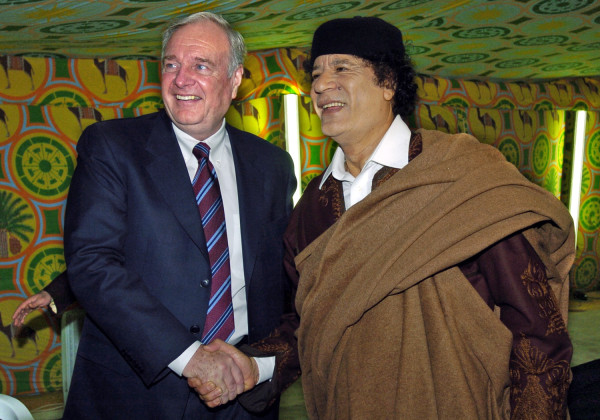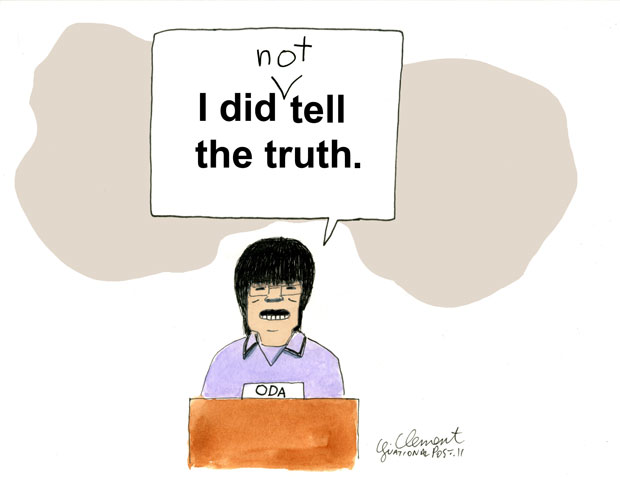Week four of Timmy Hudak’s bad week
But fret not, Conservatives! Rocco Rossi can fix anything!
Why should you care about Libya
Just did an interview about this with NewsTalk 1010. We talked a fair bit about my 1992 book about the country.
You’re unlikely to visit the place anytime soon; you’re not even sure you could spot it on a map. Why should you care?
Summer 2011: not a good Summer to start pitching a new and improved Green Shift.
On Libya
More than once in recent days, I have wondered why Paul Martin Jr., as Prime Minister, lavished so much attention on Muammar Gaddafi. Then, as now, Gaddafi was an an anti-Semite, a serial abuser of human rights, and a funder of terrorism. Incensed by Martin’s decision to travel to Libya, I wrote the column below for the Post, asking why the Hell a Canadian Prime Minister had decided to give legitimacy to a dictator (and particularly since his regime killed a Southam News reporter, and was never called to account for it).
Anyway – Martin has been gone for years, but Gaddafi remains. I don’t know what will be the outcome of current events – and, unlike a few of the current crop of instant-experts, I’ve even written a book about Libya – but one thing I do know: our collective cosying-up to Gaddafi helped him maintain his grip on power. We bear some responsibility, indirectly or otherwise, for the carnage now taking place in the Socialist People’s Libyan Arab Jamahiriya.
The column:
Questions for Muammar Gaddafi
by Warren Kinsella, National Post, 16 December 2004
Sometime after midnight on April 14, 1987, the body of a young Canadian man slammed into the pavement outside the entrance to the Zanzour Tourist Village in Tripoli, Libya. When found by a member of the hotel’s night staff around 6 a.m., the man was clearly dead.
The death, Canadians would later agree, was an outrage. Many believe it was murder. The bright young man was a reporter — an employee of Southam News, the news organization that preceded CanWest. And the reporter had been asking a lot of questions about Libyan support for terrorism. His name was Christoph Halens. He was only 32 years old.
The circumstances of Halens’ demise remain unresolved despite the passage of more than 17 years. Also unresolved are questions surrounding the enthusiastic support of the dictatorship of Muammar Gaddafi for a plethora of terrorist and extremist organizations in the years before and after Halens’s death.
Despite all this, Prime Minister Paul Martin plans to travel to Libya this week, following the trail of a number of other world leaders, to cozy up with Gaddafi. Why?
Halens was sent to Libya in 1987 to report on a “peace conference” sponsored by Gaddafi’s rogue regime. The Southam reporter discovered that invitees included representatives from the Irish Republican Army; the PLO; Canadian, British and American neo-Nazis, such as the Nationalist Party and the National Front; virulent anti-Semitic black nationalist organizations, such as the Nation of Islam; the American Indian Movement; and, oddly, the Canadian Union of Postal Workers.
Prior to the conference, the Libyan regime had more or less openly provided millions of dollars in support to an equally diverse cast of murderers, among them the Basque separatist movement, Germany’s Red Army Faction, the Abu Nidal organization, the Popular Front for the Liberation of Palestine, the Japanese Red Army and Black September. Even when a world oil glut pushed down Libya‘s annual petroleum revenues, Gaddafi boasted in November 1986: “We have increased our support … for all liberation movements throughout the world.”
According to the RCMP, Canada’s Foreign Affairs Department and Southam News, which conducted a rigorous investigation into the death of their employee, Halens raised the ire of the Libyan secret police when he started asking questions about Gaddafi’s involvement with neo-Nazis, anti-Semites and terrorists. (The notebooks Halens had been using all that week in Tripoli were never found.) He was murdered for doing his job as a journalist, in other words. That, certainly, is the view of his family, friends and colleagues.
Following an autopsy in Libya, Tripoli’s deputy district attorney responded to Canadian pressure by declaring that Halens had been “suffering from a psychological illness,” and therefore threw himself off the roof of the Zanzour Tourist Village. To its initial credit, the Conservative government of Brian Mulroney did not accept that absurd conclusion. The former secretary of state for external affairs, Joe Clark, told the House of Commons that the government was prepared to conduct a second autopsy. But eventually, Halens’ death slipped from the headlines and the government priority list. The mystery remains unsolved.
This would be a perfect time for Mr. Martin to demand the facts surrounding Halens’ death. But as far as any of us know, the issue does not form any part of the Prime Minister’s agenda. When asked about the purpose of the trip, one of Mr. Martin‘s chief spokesmen stated: “Given that he’s in the region, he wanted to meet with Gaddafi, as have so many other world leaders recently.”
Is that all it takes? We happen to be in the neighbourhood and decided to pop by? That’s not good enough.
If Canada is to enhance its stature in the international community as a defender of human rights, it should start by standing up for its own citizens. Mr. Martin must demand a full and frank accounting not only of Halens’ death, but also of the issue that brought him to Libya: the country’s support for terrorism and extremism.
Christoph Halens and his fellow Canadian citizens deserve at least that much.
[Warren Kinsella is a former Liberal party advisor and the author of a book investigating the death of Christoph Halens: Unholy Alliances: Terrorists, Extremists and the Libyan Connection in Canada.]
The blog is dead
Long live Twitter and Facebook, the King and Queen!
The Internet and American Life Project at the Pew Research Center found that from 2006 to 2009, blogging among children ages 12 to 17 fell by half; now 14 percent of children those ages who use the Internet have blogs. Among 18-to-33-year-olds, the project said in a report last year, blogging dropped two percentage points in 2010 from two years earlier.
Former bloggers said they were too busy to write lengthy posts and were uninspired by a lack of readers. Others said they had no interest in creating a blog because social networking did a good enough job keeping them in touch with friends and family.
Blogging started its rapid ascension about 10 years ago as services like Blogger and LiveJournal became popular. So many people began blogging – to share dieting stories, rant about politics and celebrate their love of cats – that Merriam-Webster declared “blog” the word of the year in 2004.”
The cyber-sewer: Hate bloggers explained
Acupuncturegirl advised: “Scott, shut the hell up. You are gross.” Dutra1 noted: “OK, Scott, you get your free pity pills. Now examine the image you see in the mirror; is it a man?”
Evgeny Morozov, author of “The Net Delusion: The Dark Side of Internet Freedom,” told me Twitter creates a false intimacy and can “bring out the worst in people. You’re straining after eyeballs, not big thoughts. So you go for the shallow, funny, contrarian or cynical.”
Nicholas Carr, author of “The Shallows: What the Internet is Doing to Our Brains,” says technology amplifies everything, good instincts and base. While technology is amoral, he said, our brains may be rewired in disturbing ways.
“Researchers say that we need to be quiet and attentive if we want to tap into our deeper emotions,” he said. “If we’re constantly interrupted and distracted, we kind of short-circuit our empathy. If you dampen empathy and you encourage the immediate expression of whatever is in your mind, you get a lot of nastiness that wouldn’t have occurred before.”
Leon Wieseltier, literary editor of The New Republic, recalled that when he started his online book review he forbade comments, wary of high-tech sociopaths.
“I’m not interested in having the sewer appear on my site,” he said. “Why would I engage with people digitally whom I would never engage with actually? Why does the technology exonerate the kind of foul expression that you would not tolerate anywhere else?”
A local case in point: Canada’s most widely-read white supremacist. Why did TVO or the National Post or Maclean’s give her a platform/credibility? Why would the Canada Israel Committee junket her to Israel?
Good questions.
In today’s Sun: Odious
It’s never the break-in. It’s always the cover-up.
Voters are pretty reasonable, you see. There can be a guy running for mayor of Toronto, for example, and he can be linked to all sorts of malfeasance — drunk driving, drugs, you name it — and he can still end up getting elected in a landslide. As long as the politician confesses to his or her misdeeds early on (which Rob Ford did, sort of), people will forgive. They don’t get as worked up about these things as the media and the political chattering class do.
“Go f@#& yourself”
The Globe’s Gary Mason, whose stuff I have always admired, wrote this in the paper this morning:
“This week, journalists in this country were all atwitter about a tweet of Maclean’s columnist Scott Feschuk. He jumped into the middle of a spat between Canadian Press reporter Jennifer Ditchburn and Dimitri Soudas, Prime Minister Stephen Harper’s communications chief, and sent a shockingly crude tweet about Mr. Soudas.”
Being shockingly crude myself, I wanted to see what Feschuk had Twitter tweeted. As far as I can tell, it’s this:
“Question: Would it be inappropriate at this point for me to tell @pmosoudas to go fuck himself?”
Feschuk, who types for Maclean’s, wrote that on Wednesday afternoon. It must have riled PMO press flak Dimitri Soudas, because within ten minutes, Feschuk was tweeting stuff suggesting that Soudas had complained to Feschuk’s bosses at Maclean’s. “Don’t go crying to my Mommy,” wrote Feschuk. I couldn’t find anything that Soudas tweeted, apart from a couple snarky messages to Ditchburn, who is the nicest person on Earth, and who had tweeted about Jason Kenney for stating that Radio Canada lies all the time, or something like that. When you poke through Twitter entrails after a while, your head will start to hurt, as mine now does.
There’s all sorts of fun stuff we can chit-chat about, here – Why has the Harper regime decided that Twitter is the best place to communicate with Canadians? Does CBC lie all the time? Why does the Prime Minister’s press spokesman think it’s good strategy to suggest the media lie all the time? Why does anyone in the Reformatory Party regard Jason Kenney as strategic, other than what he is, which is a loose cannon whose big mouth torpedoed Bev Odious? – but I wanted to focus on Feschuk’s shockingly crude suggestion to Soudas.
As anyone who has ever worked with me on a campaign will know, I swear all the f@#&ing time. I can’t help myself. I f@#&ing swear like a f@#&ing trucker. I like people who swear; thus, this, my favourite Christmas carol. That day that my former boss Jean Chretien told Michel Vastel to f@#& off was one of the happiest days of my life – only bettered by the day that my former boss strangled a maniacal Bolshevik who was blocking his path. God, I loved that.
Anyway. What do you think, O Oracles of Webby Truth and Wisdom? Is it wrong for political people to tell each other to go f@#& themselves? Is it “inappropriate,” as Feschuk queried? I say no!
Unburden yourselves – and feel free to swear your f@#&ing heads off, while you’re at it.
Help wanted
Speechwriter Position
Position Summary
The Speechwriter will work with the Communications Department to complete products in a timely manner, often with competing deadlines, and a caucus in a state of perpetual civil war. This involves working with multiple departments, and multiple hidden agendas, to gather the necessary information and incorporating the feedback given by the Director of Communications and the Principal Secretary, as well as Mike Harris and the Ontario Landowners’ Association.
Major duties and responsibilities
- Write Speeches, Columns, News Releases, and falsify your party’s record, and other products as needed
- Try and work cooperatively with all departments towards the completion of projects, but end up infighting about just about everything
- Attend and contribute to interdepartmental meetings with respect to communications products, and always work to ensure that health care, education and human rights are gutted
- Provide creative support on the Leader’s materials to our audio, video and graphics team, and make stuff up as much as possible
- Pretend to listen to Rocco Rossi – who, as we all know, got less mayoralty support than Enza the Supermodel
Education & Experience
- University degree, or (ideally) OLA membership
- 3-5 years of previous communication experience, or the complete absence of a soul
Skills
- Strong, concise written communications skills are somewhat desirable, but not a prerequisite (cf. our caucus)
- High attention to detail, such as when expensing the leader’s Chicken McNuggets
- Firm understanding of current issues and organizational values, which are: cut, slash, and burn
- Ability to work under pressure while listening to senior leader’s staff scream at each other. Again.
- Ability to work long hours in the service of Big Tobacco and Multinational Pharmacies
- Exceptional multi-tasking skills and ability to prioritize workload, because firing nurses and closing hospitals is a lot of work, you know
- Ability to use tact, judgment and discretion – qualities that are notably absent within the Ontario PC team (cf. our caucus, Leader)
- Willingness to screw over PC stalwarts like Norm Stirling, because that was a condition of the dirty deal Tim Hudak did with Randy Hillier
Details
Nature of position: Full time with benefits, until you are flushed by someone close to the Leader, that is, which is highly likely around here
Salary: Commensurate with experience, but nearly as much as you will get flogging ciggies to kids as a Big Tobacco lobbyist, after we lose the election



